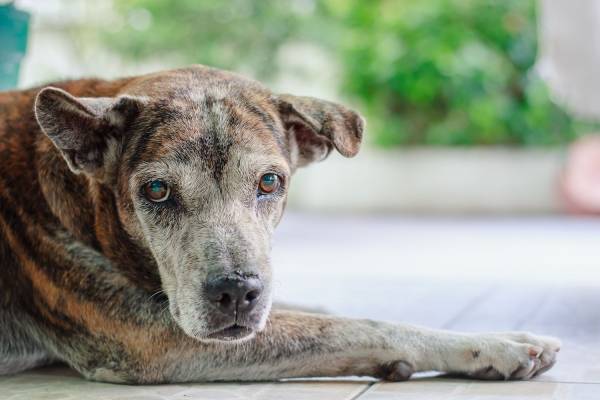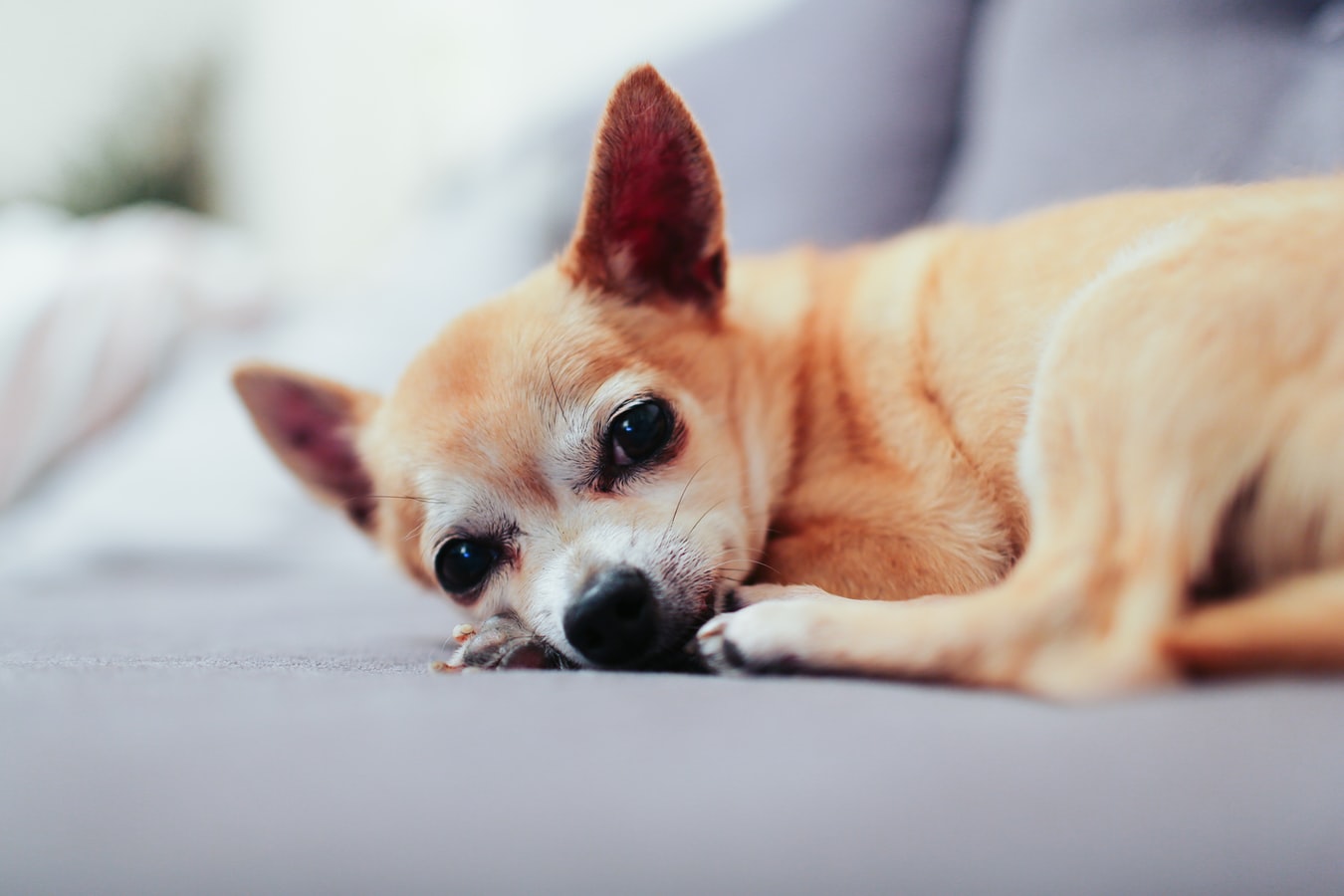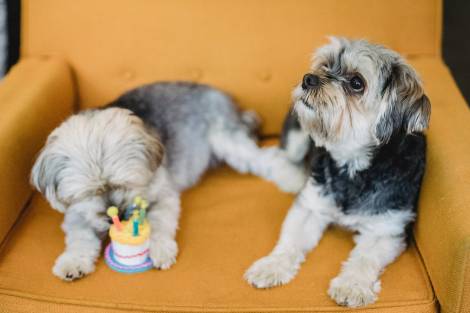Your dog has always been great about peeing outside; however, your older dog is now peeing in the house! What’s the problem? Why would a dog that used to be house-trained start having potty accidents in the house?
Connect with a verified veterinarian in minutes. Licensed vets are available 24/7 to answer your questions. No need to worry about your furry family member.
If you’re faced with this situation, know that you’re not alone. It’s normal to feel frustrated and worried by this new development in your dog. The first bit of advice we can offer is not to get upset or get angry with your dog.
Your dog’s behavior could be caused by the natural aging process he’s going through. Even some older humans have these types of issues; dogs are no different.
We’ve put together some information on what may be causing your old dog to pee in the house and what you can do to help him.
What’s Causing Your Older Dog to Pee in the House?
Here are some of the most common reasons your senior dog is peeing in the house:
Age: as dogs age, they may suffer from different health issues, behavioral & cognitive issues (such as canine dementia), poor bladder control, and more.
Mobility problems: just like us, dogs can suffer from mobility problems as they age. The cause may include arthritis, joint issues, and more. These can make it more challenging for your older dog to make it outside in time, which means more accidents in the house.
Health issues: senior dogs may suffer from age-related health issues that can cause them to lose bladder control. These include kidney failure, urinary tract problems, incontinence, diabetes, Cushing’s disease, and more. Infections can also cause bladder problems.
Emotional causes: changes in your dog’s life, the family, or your dog’s environment can cause confusion, stress, and anxiety in your senior dog. These can all lead to your older dog peeing in the house. Some dogs may also use this as a way to mark their territory, especially if a new pet has joined the family or you’ve moved to a new place.
If your older dog is having trouble peeing in the house, then it’s time to call the vet. Your dog would benefit from a checkup. The vet can examine your dog and run tests to see if there’s an underlying health issue. And if the problem is caused by emotional or behavioral problems, the vet is the best source of guidance and advice on how to treat the problem.
Always avoid scolding your dog when he’s older and having this type of problem. He may not be able to help it. And if the issue is caused by stress, then scolding will only make it worse.
How to Stop My Older Dog from Peeing in the House
The solution will depend on the vet’s diagnosis. If they’ve found your dog has a treatable health condition, then treating that problem may resolve your dog’s peeing in the house. For instance, if your dog has mobility issues caused by pain, then the vet may prescribe pain medication to make your dog more comfortable. If the vet finds your dog has a urinary tract infection, then treating your dog with antibiotics may resolve the problem.
Even so, there are some things you can do to keep your older dog from going potty in the house. Let’s take a look.
1). Consider potty retraining: while this isn’t pleasant, it can help remind your dog where it’s acceptable to go potty. “Revisiting” the problem can help your dog, even if he’s suffering from a medical issue. As with any type of dog training, always remember to praise and offer rewards when your dog does the right thing in the right place!
2). More potty breaks: retraining may not always be the solution, depending on your dog’s problem. So, you may want to consider adding more potty breaks throughout the day. If you must be away during the day, then it may be helpful to try using doggie diapers.
You might consider using disposable diapers. You’ll find doggie diapers are made to fit either female dogs or male dogs. So, be careful when buying diapers for your dog. You might consider this brand: Doggie Disposable Diapers for females or males. Diapers are bought by the weight and size of your dog. The right fit is essential! There are some other options if you’d prefer to use reusable, washable doggie diapers.
These may not be the best option for all dogs. Some dogs tend to chew off the diaper while you’re away. The only way to see if your dog tolerates the diapers or not is to try them out.
3). Doggie pee pads: another option is to use doggie pee pads. The pads can be placed where your dog is determined to pee in your home. They work to lock in both wetness and odor. Pee pads are often used to potty train puppies but can also be helpful for older dogs who are peeing in the house.
You might consider . They come in various sizes, so you can buy the right size pad for your fur baby.
4). Clean up: when your dog urinates in the house, it’s important to clean it up as soon as possible. This is for everyone’s health and wellbeing. Urine can sometimes have a very strong smell. It can also help your dog find his last pee spot, which may encourage him to go again. So, be sure to use products meant to clean up this type of problem.
You may want to consider Rocco & Roxie Supply Professional Strength Stain & Odor Eliminator. This product uses natural enzymes to get rid of odor and germs from urine, vomit, feces, and more. The product is gentle and contains no chlorine. It’s safe to use around pets and children and comes with a 100% satisfaction guarantee.

Review symptoms, medications & behavior to keep your pets healthy with a Vet Online in just minutes.
Ask a Vet Live NowSumming It Up
If your older dog suddenly starts to pee in the house, then it’s a good idea to make an appointment with the vet. Your dog needs to be checked for underlying health issues. It’s possible he has an infection or another health problem that may make it difficult for your fur baby to get outside in time.
Once the vet has determined the cause, then it’s best to follow their advice on how to treat this issue. They may suggest some of the solutions mentioned in this article.
Connect with a verified veterinarian in minutes. Licensed vets are available 24/7 to answer your questions. No need to worry about your furry family member.

Tom
Tom has always loved to write since he was little - he wanted to be either a writer or a veterinary doctor, but he ended up being a professional writer while most of his works are based on animals. He was born in San Francisco but later moved to Texas to continue his job as a writer. He graduated from the University of San Francisco where he studied biotechnology. He is happily married and a soon to be father!
Review symptoms, medications & behavior to keep your pets healthy with a Vet Online in just minutes.
Ask a Vet Live Now



